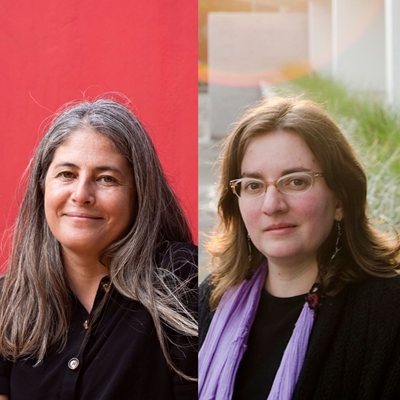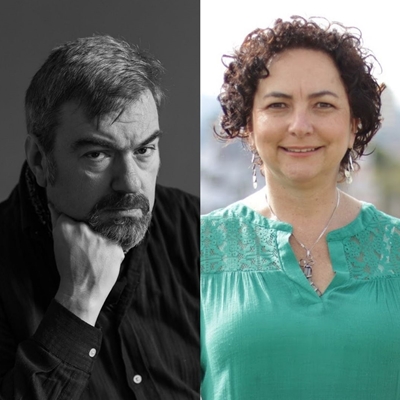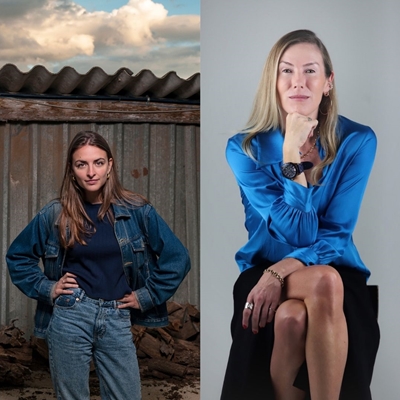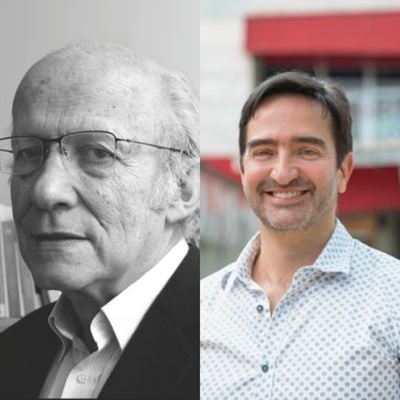Hay Festival Jericó 2024
To buy tickets, please click here. If you wish to register to see the live streaming of events, please select the option "Register to watch online" when this option is available.
If you have any general questions, you can find us at contacto@hayfestival.org.
Event 1
Selva Almada in conversation with Catalina González
A Latin American perspective on an old empire
Teatro Santamaría
Read moreSelva Almada (Argentina), a journalist and writer, is one of the most respected authors in Latin American literature. Author of the non-fiction Chicas muertas (2014) and of the novels El viento que arrasa (2012), No es un río (2020) and Brickmakers (2021), her books have been translated into at least nine languages and, among other awards, she received the 2019 First Book Award given at the Edinburgh International Book Festival. She has contributed to an anthology that the Hay Festival and Anagrama have published recently, one about how the Latin America collections reached the British Museum. She will talk about her recent work with Catalina González.

Event 2
Roberto Palacio in conversation with Adriana Villegas
Thought in the era of anxiety
Museo de Arte Religioso
Read moreRoberto Palacio presents his book La era de la ansiedad, which tackles the vertigo and unease that are characteristic of our times. From the construction of identities based on seeking virtual approval, to the way in which we relate emotionally, via investments in intangible products, Roberto Palacio explores how society’s new practices and dynamics seem to feed an ever more widespread sense of anxiety. In conversation with Adriana Villegas, the philosopher will offer some ideas about how to behave in a world full of pressures and tensions.

Event 3
Irene Solà in conversation with Sara Jaramillo Klinkert
Stories that live in the mountains
Teatro Santamaría
Read moreIrene Solà (Spain) is the author of the publishing phenomenon When I Sing, Mountains Dance (2019), written in Catalan and translated into over 20 languages, with 15 editions in circulation and winner of the 2019 Cálamo Prize and the 2020 European Prize for Fiction. In her new book, Et vaig donar ulls i vas mirar les tenebres, Solà portrays a world full of witchcraft, ghosts, beasts and demons, and a group of women gathered around the deathbed of the oldest of them. Together, they reconstruct over three hundred years of history. In conversation with Sara Jaramillo Klinkert.

Event 4
Eduardo Romero García in conversation with Pascual Gaviria
Skin black with coal
Museo de Arte Religioso
Read moreIn his work, Eduardo Romero analyses and criticises matters of the foremost importance, such as colonialism, migratory policies and the leftovers of capitalism. In his most recent book, ¿Cómo va a ser la montaña un dios? (2023), he traces the route connecting the Colombian Caribbean coast with the Spanish region of Asturias, in a surprising way, one that is almost invisible to us under normal circumstances: coal mining. Romero tells a powerful story that links an old man in Gijon, Spain, who was once a miner, with a group of Colombian migrants who flee their country in a boat that transports coal from El Cerrejón, in La Guajira, to a Spanish port. In conversation with Pascual Gaviria.
With the support of Acción Cultural Española (AC/E)

Event 5
Manuel Rodríguez Becerra in conversation with Andrés Roldán
What if the future is switched off?
Teatro Santamaría
Read moreA country with the biodiversity of Colombia, which has within its borders ecosystems that are important to the survival of life on Earth, including the Amazon, the Andes mountains and the Sierra Nevada, faces serious challenges with regard to the climate emergency and the increase in global temperatures. The University of the Andes lecturer, politician and environmentalist, Manuel Rodríguez Becerra,(Colombia), is the author of numerous books including Colombia y sus bosques and the recent El futuro ambiental de Colombia; Becerra will talk to Andrés Roldán about the significant steps regarding environmental care taken over the course of the last decade, including the strengthening of institutions that care for biodiversity and the construction of political will.

Event 6
Eliane Brum in conversation with Adriana Villegas
Resistance in the Amazon
Museo de Arte Religioso
Read moreEliane Brum is a Brazilian journalist, writer and documentary maker. She was educated at the Pontifícia Universidade Católica in Rio Grande do Sul and has won over 40 Brazilian and international reporting awards. She participated in the compilation of special reports on Doctors Without Borders, ¡Dignidad!, which also featured authors such as Mario Vargas Llosa. She is the co-director of two documentaries: Uma historia severina and Gretchen: filme estrada. She is the author of La Amazonia: viaje al centro del mundo (2024), a book that narrates her move from Sao Paulo to Altamira, a city where the construction of one of the world’s largest (and most ecologically devastating) dams is taking place. Brum will speak to Adriana Villegas.
Simultaneous translation from Portuguese to Spanish available

Event BQ
'Desde el Banquito' with Roberto Palacio
Living in the era of anxiety
Museo MAJA
Read moreNowadays we define ourselves as stories, narratives that we only need to say out loud about ourselves and others must accept them as true. It seems that, above and beyond this, nothing solid or objectively true can determine us: I choose my gender, my desired pronouns, my ideological inclinations. However, I would like to be supported by others; the new forms of constructing my identity involve “likes” in virtual groups. And if the “like” never arrives? This is la era de la ansiedad, a time without utopias in which I am always waiting for a clue about myself. At this talk with Roberto Palacio we will deal with the intricate labyrinths that we have been led into by a world in which nothing seems to be any better than anything else… and the paths that are there for us to find meaning in all of it.

Event 7
Javier Moro in conversation with Ana Cristina Restrepo
They want us dead
Teatro Santamaría
Read moreThis celebrated Spanish author Javier Moro will talk to Ana Cristina Restrepo about his most recent books. Moro, one of the bestselling Spanish-language writers, is also a journalist and has worked as a screenwriter and film producer in Hollywood. His books include Senderos de libertad (1992), El pie de Jaipur (1995), Las montañas de Buda (1997), a work written together with Dominique Lapierre: Five Past Midnight in Bhopal (2001), Passion India, The Red Sari, El imperio eres tú (2011 Planeta Prize) and, more recently Nos quieren muertos, which the author will talk about at this event. This book, which is both an exciting read and a rigorous study, is about a key figure for understanding contemporary Venezuela: Leopoldo López. Upon being jailed in 2014, after leading massive protests against the Maduro government, López became a symbol of the struggle for democracy in the country.

Event 8
Nona Fernández in conversation with Perla Toro
The dangers of the truth
Museo de Arte Religioso
Read moreNona Fernández is a Chilean actor, writer and screenwriter. She contributed to an anthology, published by Hay Festival and Planeta in late 2023, about Latin American viewpoints on the Colombian truth report. She has been awarded with the prestigious Sor Juana Inés de la Cruz Prize, given by the Guadalajara International Book Fair. She is the author of a number of books, including the novel Mapocho and the book of memoir, Voyager. She will talk about her most recent work with Perla Toro.

Event 9
Poetry gala
With Juan Manuel Roca, Octavio Escobar and Catalina González
Teatro Santamaría
Read more
Event P2
Screening of '¡Viva Edy! La historia de una música indestructible'
Parque Principal de Jericó
Read moreA journey between past and present, showing us the career of the maestro Edy Martínez, the Colombian pianist, composer and music arranger who was one of the major forces in Latin music in the 1960s and 70s. In the magnificent and grey metropolis of New York walks the slight figure of a man whose brilliance was hardly suspected, and even today goes unnoticed by many, despite the uniqueness and magnitude of his legacy.
Director: Carlos Ospina. Colombia.
91 min.

Event C2
Los Hermanos Aicardi in concert
Parque Principal de Jericó
Read moreRodolfo Aicardi was a Colombian singer-songwriter of tropical music considered by many “the King of ‘Chucu-Chucu’”. His sons, Los Hermanos Aicardi, want to make the history of this music unstoppable and continue with the musical and cultural legacy that represents the experiences of Colombians, from their joy, told through cumbia, to their most poetic feelings told through ballads and boleros.


